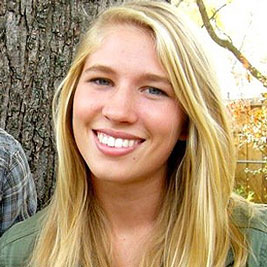 Karis Hustad, originally from Falcon Heights, is a senior in journalism and sociology at Loyola University Chicago. (Courtesy of Karis Hustad)
Karis Hustad, originally from Falcon Heights, is a senior in journalism and sociology at Loyola University Chicago. (Courtesy of Karis Hustad)
By Karis Hustad
Karis Hustad, originally from Falcon Heights, is a senior in journalism and sociology at Loyola University Chicago. She is spending the semester studying journalism and Arabic in Rabat, Morocco.
A classmate and I sat in her living room on Wednesday, hitting refresh on our Twitter feeds.
Throughout the day we watched as the Arab world exploded into protests over an American-made film mocking Islam, resulting in the death of the U.S. ambassador to Libya, J. Christopher Stevens. Each hour seemed to include a new country. Egypt, Algeria, Kuwait, creeping closer by the minute to Morocco, where we are studying abroad this semester.
Finally, we saw it: a retweet of a TwitPic showing hundreds gathered outside the U.S. Consulate in Casablanca, about an hour south of the capital city of Rabat, where we live. Further news slowly spread: first the numbers (300-400), then quotes of chants (“Allah! Allah!”), and finally a video of several young men setting fire to an American flag in the middle of the crowd.
This is an image I had seen many times on the news before: nameless Arab faces yelling things in large crowds, usually waving a burning American flag. But suddenly that clip was thousands of miles closer to where I am, and had the potential to jump off the computer screen and occur outside my window.
The thought was scary, but it also seemed surreal. My first experience of Morocco was actually in Casablanca, where I caught a train to Rabat. A friend and I walked around the same neighborhood as the consulate, and two Moroccan men helped direct us to a few sites we wanted to visit. Two weeks later, in that same spot, the situation had turned very dangerous.
The feelings here about the United States are nuanced. There are the people who shouted “Happy 9/11” to my friend as she walked through the medina on Tuesday, and there are our host families, who greet us with a friendly “Salam Alaikoum” and homemade couscous on Fridays. There are young people who say they believe the most important thing is to ensure peace, and the young men in the Casablanca protest video who relight the flag multiple times to ensure it is engulfed in flames.
Many of my fellow students received worried emails and phone calls from parents and friends back home the next day as the news spread to the United States. Everyone assured his or her loved ones that everything is OK, but the immediate concern isn’t surprising: News about the Arab world has never been overwhelmingly positive. Rarely do we even have the chance to develop a nuanced view of a place like Morocco. The only time it makes our media is when Moroccans protest against America.
After seeing the news from Casablanca, my friend and I hopped off the couch see if the unrest had spread north to our city. But Rabat was business as usual. We sat in a bustling square for an hour. The only conflict we witnessed was people bumping into one another in the rush hour crowd.
.






